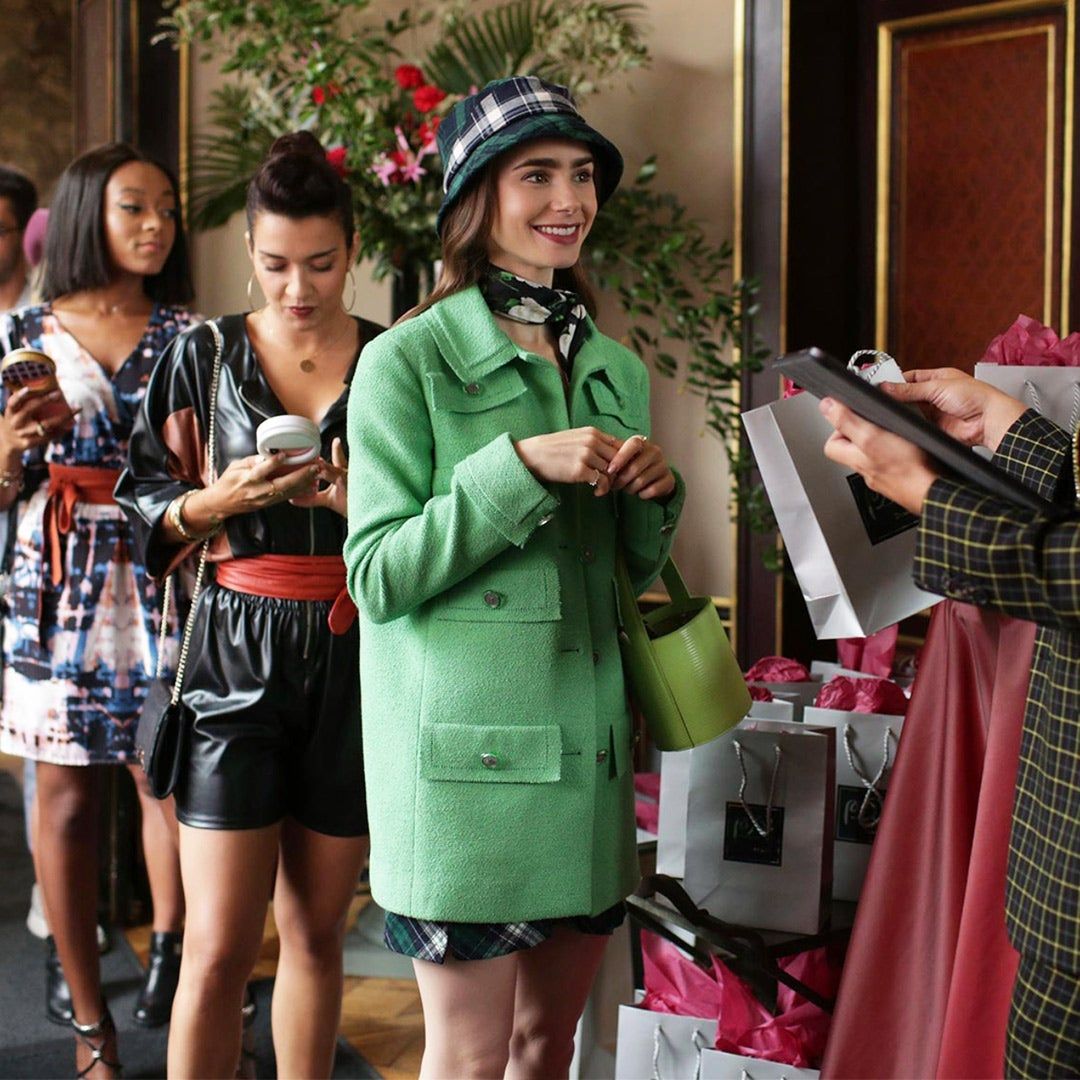
Let's Discuss
Why We Can't Stop Watching Emily in Paris
Columnist Liz McDaniel reflects on the undeniable pull of the best worst show.
- Written By
- Liz McDaniel
Much has been written about the latest Darren Star confection so let me summarize: it’s terrible and we love it. The acting is subpar, the fashion (even in the expert hands of Patricia Field) rings false, and the show was obviously written by someone who knows as much about social media as, well, I do. But if I’ve received one text about binge-watching Emily in Paris, I’ve received ten. We can’t stop.
By “we,” of course, I mean women like myself, women of a certain age—not quite middle-age, though 2020 has made us feel like it—particularly mothers, who are old enough to remember when, before Sex and the City and long before Emily in Paris, Darren Star gave us that enviable trifecta of young women making poor decisions: Brenda, Kelly and Donna. (If your brain just went immediately to “Donna Martin graduates,” I’m talking to you.) When I think of 90210, I can’t help but think of Kelly’s cherry red BMW convertible. Beyond all of the obsessing over boys and clothes and bangs, it represented a freedom that, as a girl too young to drive, felt just beyond my grasp. Fast forward three decades and I had the same sinking feeling watching Emily in Paris.
The simple answer here is that we can’t stop watching because it’s escapist. And on the surface, that’s true. For women mostly stuck at home with children and work performing an endless cycle of meal preparation whilst wearing athleisure, it’s the perfect storm of pre-pandemic fantasy: foreign travel and crowded city streets, delicious meals lingered over in tiny candlelit restaurants, professionally sculpted eyebrows and, I’m sorry, are those high heels?
Forget the barrage of beautiful people who can actually exist within six feet of one another. For me, someone who recently left the best city in the world (sorry, Emily, but it’s actually New York) and a life I had no intention of upending, the nostalgic devil has been in the details. Perfect pink roses wrapped in mint green tissue paper. The way she runs up the stairs to her apartment. A chocolate croissant consumed while rushing down narrow streets crowded with perfect strangers. Even the moment when she steps through the front door of her apartment in the morning, I can feel the crisp air, catch the whiff of someone else’s coffee. Not to mention the friend across the table, at an actual restaurant, mercifully declaring Sancerre to be a breakfast wine (yes, Mindy, yes!).
Sure, there were moments of frustration at the sheer entitlement of Emily. When she sent that steak back, for example, I felt something close to rage. I had just spent an hour—an hour!—trying to recreate the kale salad from my favorite restaurant in the West Village. I donned rubber gloves to “massage” the kale, turned most of my white suburban kitchen bright green and still did not come close— and she has the nerve to do anything other than to savor that professionally prepared meal and thank her lucky stars?
But mostly it boils down to longing.
For all that’s been lost to our new normal (and to be clear, I thank my lucky stars that I have my health and my family and my job when so many people have lost so much more), I couldn’t put my finger on what I missed before I saw Emily in Paris. I knew it had something to do with other women and my own ambition and tiny, crowded restaurants, and that feeling of having a full night of “Okay, please, tell me everything” goodness ahead. It had something to do with being a person out in the world and the deep, guttural pull of an awkward moment shared between strangers. With being surrounded by others in a way that didn’t feel dangerous, or maybe it did, but not because you could contract or infect them with a deadly virus. It was more likely that you’d say the wrong thing or someone might tell you a story that would break your heart just a little bit, because in the before times, when another person could share their pain, face to face, it was possible to feel it too and not be alone at the same time. Sure there’s Facetime and Zoom and group texts—oh, are there group texts—but empathy was never meant to be felt in isolation. Yet, here we are. And if there’s a bad show that makes it a little bit better, that bridges that impossible pandemic-driven divide, between close friends and distant strangers and even twitter enemies, with its “Is this really all there is?” mediocrity, I’ll take it.
So there it is, the darker side of why we love it. We love it because this has been one long year of lowering our expectations. We can’t worry about how bad it is because, frankly, we’re exhausted. Many women are balancing work and childcare and homeschool and cooking and also the job of educating men and government officials and employers on the importance of helping women balance work and childcare and homeschool and cooking. It’s a global pandemic and even the most privileged women are staring down the barrel of the limitations of our gender. For a generation of mothers being forced out of the workplace in unprecedented numbers, there is something comforting, quaint even, about watching a young woman pursue her dreams so single-mindedly. So forgive us if at the end of the day we just want to drink a goblet of wine, text our friends and live vicariously through someone who, not unlike our former selves, appears to have no idea what’s coming.
Liz McDaniel is a freelance writer and Contributing Editor at Maisonette. You can follow her on instagram @lizmcdanielwrites.